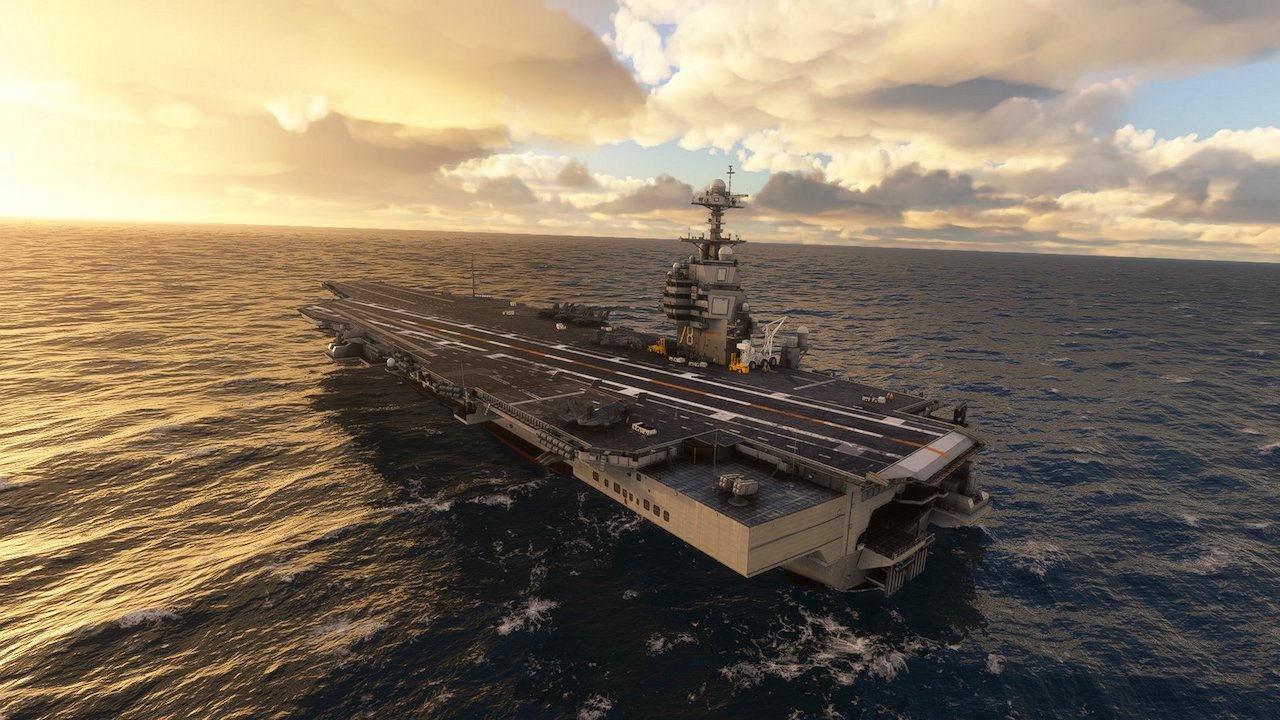– Redone all starting points, helipads and runway configurations for better MSFS2024 compatibility
– Fixed minor texture glitch in Arleigh Burke 3D model
– Fixed rendering of safety nets on Ford-class ships
– Fixed multiple minor glitches in USS Nimitz class models
– Fixed glitch causing incorrect direction of carrier wake effects
– Added multiple LOD models to Ford-class ships for better performance
– Added multiple LOD models to Arleigh Burke static and dynamic objects for better performance
– Added multiple LOD models to Ticonderoga static and dynamic objects for better performance
– Fixed minor texture glicth in F-18F 3D model
– Added multiple LOD models to F-18F static object for better performance
– Added multiple LOD models to F-14A static object for better performance
– Added multiple LOD models to S-3B static object for better performance
– Added multiple LOD models to E-2C and E-2A static objects for better performance
– Added multiple LOD models to C-2A (both variants) statics objects for better performance
– Added multiple LOD models to wheelchock, towbars and accessories in general
– Added multiple LOD models to Nimitz-class ships (static and dynamic)
– Revised model definitions for escort ships, to be compatible with MSFS2024 standards
The Gerald R. Ford class is a class of nuclear powered aircraft carriers currently being constructed for the United States Navy.
The class, with a planned total of ten ships, will replace the Navy’s current carriers on a one-for-one basis, starting with the lead ship, Gerald R. Ford replacing Enterprise (CVN-65), and then eventually taking the place of the existing Nimitz-class carriers.
The new vessels have a hull similar to the Nimitz class, but introduce technologies since developed with the CVN(X)/CVN-21 program, such as the Electromagnetic Aircraft Launch System (EMALS), as well as other design features intended to improve efficiency and reduce operating costs, including sailing with smaller crews.
This class of aircraft carriers is named after former US President Gerald R. Ford.
The biggest visible difference from earlier supercarriers is the more aft location of the island (superstructure). The Gerald R. Ford-class carriers will have a reduced whole-life cost due in part to reduced crew size.
These ships are intended to sustain 160 sorties per day for 30-plus days, with a surge capability of 270 sorties per day.
IMPORTANT!
This package only contains only static landable objects.
Crash must be disabled to avoid potential collision detection issues. Landmarks point are provided, but there are no Navaids associated.
Flights cannot be started directly from the ships.
Due to the high detail, there may be a slight stuttering once the ship loads (approximately 10km from the ship).
AIRCRAFT LAUNCH AND RECOVERY FUNCTIONS MUST BE IMPLEMENTED AT AIRCRAFT LEVEL.
CARRIER IS COMPATIBLE WITH INDIAFOXTECHO T-45C GOSHAWK AND F-35C LIGHTNING II.
Ship Locations (note: all static ships have an associated ICAO airport code; See “Documentation\CVN78Manual.pdf” for more):
• USS NIMITZ CVN-68:
• Near San Francisco, California, US – ICAO CV68
• Near Honolulu, Hawaii, US (vintage F-14 deck) – ICAO C68H
• Mediterranean Sea (vintage F-14 deck) – ICAO C68M
• USS Eisenhower CVN-69:
• Arabic Gulf – ICAO C69G
• Mediterranean Sea – ICAO C69M
• USS Gerald R. Ford CVN-78:
• Near Kingsville, Texas, US (T-45C Goshawk Carrier Qualification Configuration) – ICAO C78Q
• Near Los Angeles, California, US – ICAO C78P
• Near Honolulu, Hawaii, US – ICAO C78H
• Mediterranean Sea, near Israel – ICAO C78G
• North Sea (between Norway and Denmark) – ICAO C78O
• USS John F. Kennedy CVN-79:
• Off the coast of the Olympic Peninsula, Washington, US – ICAO C78W
• Near Okinawa, Japan – ICAO C79J
• Near Norfolk, Virginia, US – ICAO C79V
• Adriatic Sea – ICAO C79A
• North of Key West, Florida, US- ICAO C79K
• USS Enterprise CVN-80:
• Near Sigonella NAS, Italy – ICAO C80S
• Arabic Gulf, near Bahrein – ICAO C78G
Dynamic Locations (note: Moving carriers move on a fixed direction for approximately 20 kilometers before inverting their direction. The POI indicate the starting location):
• CVN-78 Near San Diego – suggested starting airport Miramar MCAS (KNKX) Initial ship direction: North
• CVN-78 Near Pensacola NAS – suggested starting airport Pensacola NAS (KNPA) Initial ship direction: West
• CVN-78 Near Key West – suggested starting airport Key West NAS (KNQX) Initial ship direction: North
• CVN-78 Near Norfolk – suggested starting airport Oceana NAS (KNTU) Initial ship direction: North
• CVN-68 Near Point Mugu – suggested starting airport Key West NAS (KNQX) Initial ship direction: North
• CVN-68 Near Olympic Peninsula – suggested starting airport Whidbey Island NAS (KNUW) Initial ship direction: West
• CVN-69 Near Kitty Hawk – suggested starting airport Oceana NAS (KNTU) Initial ship direction: North

